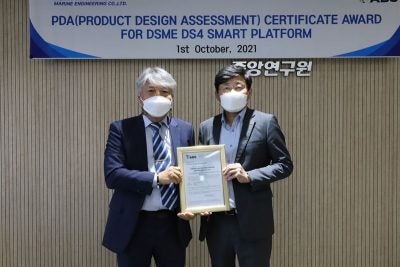
Daewoo Shipbuilding and Marine Engineering (DSME) has received a CyberSafety Product Design Assessment (PDA) from the American Bureau of Shipping (ABS) for its DS4 Smart Platform.
The DS4 Smart Platform delivers improved operational information for vessel operators by integrating data gathered from on-board equipment and systems.
The platform provides device connectivity as well as data storage, processing and visualisation.
ABS executive vice-president and COO John McDonald said: “Increased levels of connectivity and reliance on more digitally-enabled systems introduce risks into the maritime supply chain and downstream owners. Addressing risk in the supply chain allows the owner to mitigate potential negative impacts when that equipment is integrated on board vessels or offshore assets.
“The ABS CyberSafety PDA gives the owner installing the system confidence that the known vulnerabilities can be managed to minimise the impact on the vessel’s cyber security posture while providing useful operational information.”
As part of its PDA process, ABS evaluated the system’s vulnerabilities mentioned in the vendor report and tested the mitigation measures during type testing.
How well do you really know your competitors?
Access the most comprehensive Company Profiles on the market, powered by GlobalData. Save hours of research. Gain competitive edge.

Thank you!
Your download email will arrive shortly
Not ready to buy yet? Download a free sample
We are confident about the unique quality of our Company Profiles. However, we want you to make the most beneficial decision for your business, so we offer a free sample that you can download by submitting the below form
By GlobalDataDSME executive vice-president Choi Dong Kyu said: “We are pleased to have earned the ABS CyberSafety PDA to demonstrate the security of our DS4 Smart Platform.
“Digitalisation of fleet data is of benefit to owners and allows for condition-based maintenance strategies to be developed without increasing cyber security risk.”
Last month, ABS and DSME teamed up to develop designs for a 70,000CBM very large, liquefied CO₂ (LCO₂) carrier.
The joint development project will involve the development of carbon capture utilisation and storage (CCUS) technology that will eventually require bigger ships for CO₂ transport than those currently deployed in the food industry.



